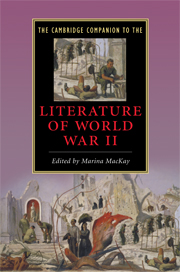10 - The Japanese war
from Part II - Global perspectives
Published online by Cambridge University Press: 28 May 2009
Summary
The Japanese history of World War II is still incomplete and controversial, especially in relation to other Asian countries with which Japan was at war, such as China and Korea. The war ended with the “divine” Emperor Hirohito's radio announcement of surrender on August 15, 1945, followed by his declaration of his newly human status on January 1, 1946. Exempted from responsibility for the war by the Allied forces (led by the USA), he became the “symbol” of the new nation - its transition from an autocratic totalitarian regime to an American-style “democratic” one - and died in January 1989 without ever admitting his responsibility. Neither did the majority of the Japanese population. The end of World War II also meant the dawn of the Cold War nuclear age: two Japanese cities, Hiroshima and Nagasaki (on August 6 and August 9, 1945, respectively), became the first victims of the atomic bombs that displayed the feasibility of annihilating humankind. Postwar Japanese literature was produced literally from the ruins of Hiroshima and Nagasaki, as well as other cities such as air-raided Tokyo and Kobe, and from a distrust of this overnight metamorphosis of Japanese society. Then, instead of Japanese military censorship during the war, writers experienced another kind of censorship by the Allied forces during the occupation period (1945-52): anything related to the atomic bomb and its victims, nationalism, the Imperial household, and communist ideologies was vulnerable.
- Type
- Chapter
- Information
- The Cambridge Companion to the Literature of World War II , pp. 137 - 148Publisher: Cambridge University PressPrint publication year: 2009
- 1
- Cited by



